Talking Shop
In our second Talking Shop episode, we talk about two of the writing resources we’ve found helpful on our journey.
Sarah discusses The Complete Handbook of Novel Writing: Everything You Need to Know to Create and Sell Your Work, by the editors of Writer’s Digest. The book is exactly what it says, and extremely comprehensive, with bonus interviews by some big name authors.
Ashley turns to podcasts and discusses one podcast she found extremely helpful to developing the opening lines and paragraphs of our books. The podcast, Helping Writers Become Authors, is hosted by K.M. Weiland and has many useful hints.
Also keep listening to hear what novels we’re currently reading.
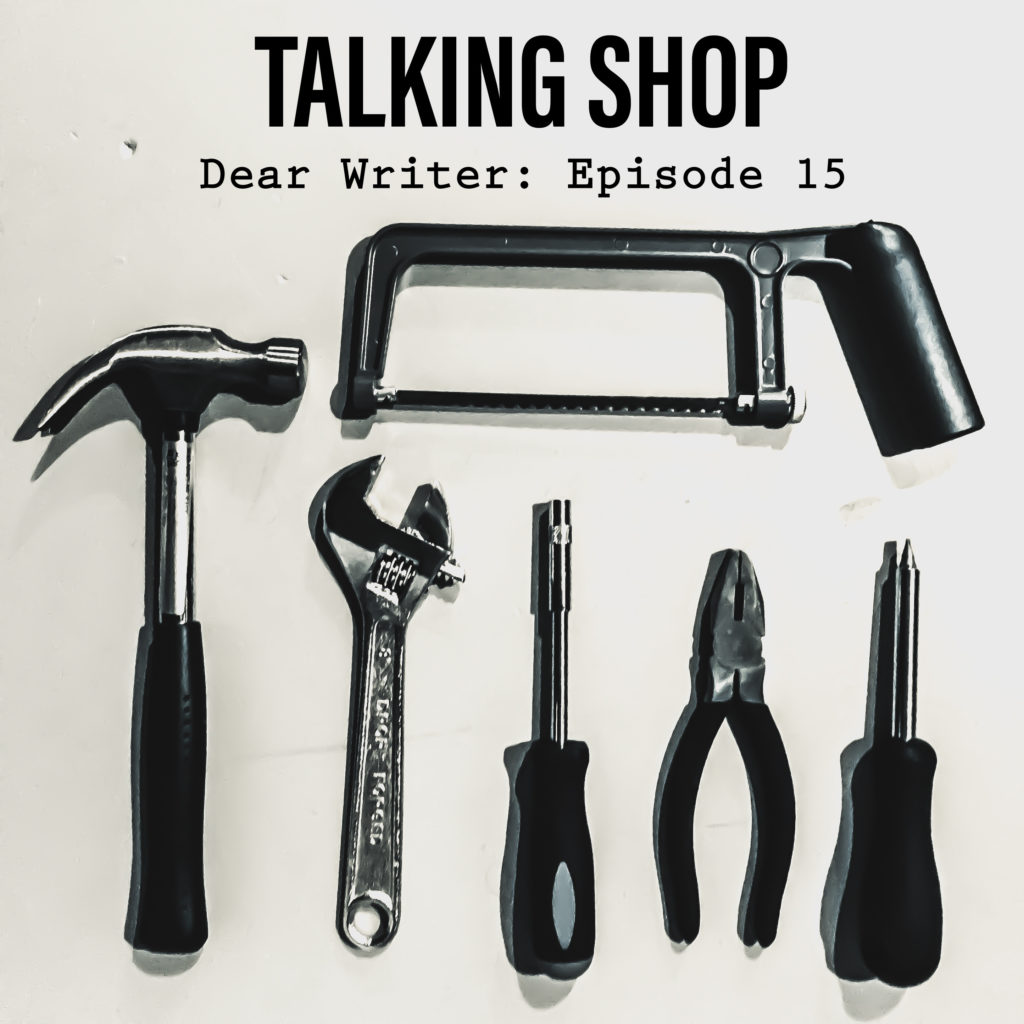
Transcript
Ashley: Hey everyone, welcome back to Dear Writer. This is episode 15 and today it is our ‘talking shop’ miniseries. It’s the second episode of this miniseries, and we’re going to have a bit of a chat about the different writing tools that we use to help us better our craft. What is your tool of the month, Sarah?
Sarah: Okay, my tool of the month is The Complete Handbook of Novel Writing, subheading: Everything You Need to Know to Create and Sell Your Work. It’s by the editors of Writer’s Digest.
Ashley: Okay. That is a hefty book. You guys probably won’t be able to see this, but I can and it is hefty.
Sarah: Yes, it is, it is very much Everything You Need to Know to Create and Sell Your Work. They’ve been very comprehensive with this book. I have the third edition here, but I know there’s… I don’t know if there’s a… which one’s the most recent. But it’s all very relevant and I doubt it’s probably changed very much except for perhaps some of the interviews. So yeah, it includes interviews and articles by a number of very prominent authors. Just to name a few, Stephen King, Jojo Moyes, Lee Child. Really, really big authors. George R.R. Martin, Jody Picoult. So, a lot of—
Ashley: Big names.
Sarah: —big names in this book. And so, it was really interesting to read, I would say it’s probably a book that I would read again, simply because it had so much information in it, and I don’t… I’m going to say I basically never read nonfiction books again. Although, I am slightly changing in that regard. As I’m finding more interesting nonfiction books, but for me it’s very much like me and travel as well. Like, I don’t like to go to the same place twice because I feel like there’s just so much to see in the world. And that’s the same with books. I feel like there’s so much to read in the world that I don’t want to read the same thing twice.
Ashley: Yeah.
Sarah: But this one is definitely worth reading twice, I would say, it just has so much information on it.
Ashley: Did you read it cover to cover. Because it’s quite…
Sarah: I did, yes.
Ashley: Oh. I feel like in a book like that I probably read it as I, you know, encountered issues. I assume it’s like in chapters or something?
Sarah: Yeah, yeah. It is, it is in chapters and you can read it as you encounter issues because it has things like um, so part one, the art and craft of a strong narrative. And so, it talks about inspiration and ideas, plot and structure, characters, craft and style. And then part two is about the writing process. So rituals and methods, revision and editing. Part three, exploring novel genres. So it goes through all the common genres. And part four, finding and cultivating a market for your work. I would say that this section is probably mainly based on more traditional publishing pathway.
Ashley: Right.
Sarah: It does mention, like I remember reading it and it did mention some more hybrid publishers. So that was quite interesting to read, sort of people who do a bit of both with traditional publishing and self-publishing.
Ashley: Mm hmm.
Sarah: Yeah, they do also talk about, a little bit about self-publishing, but I think… I don’t know when this one was… when it was actually published. 2016 so…
Ashley: That’s recent-ish, though.
Sarah: Is recent-ish, but I would say that self-publishing at that stage was still bigger than what they talk about in it, like…
Ashley: Right.
Sarah: It’s probably because that, you know, this is from very traditional sort of mindset. And so at that stage traditional mindset was only really getting into the idea that, oh, there’s this thing called self-publishing or indie, indie authors, and they still are very naive to the indie publishing world, I would say, traditional.
Ashley: Right, yeah.
Sarah: So when I’m just reading like, the chapter heading on self-publishing, it says “dissecting the self-publishing contract – five key issues for authors.” Well, most self-publishers probably wouldn’t have a contract to dissect. I guess if you’re going for self-publishing house, then—
Ashley: Possibly,
Sarah: —yes. But I personally would probably steer clear of anyone that you have to pay, so.
Ashley: Yeah, yeah. I would agree with that. Were there any bits that you wanted to highlight or, you know, kind of spoke to you?
Sarah: Yeah, so I had pulled just a couple of quotes out of it. They’re really just like pieces that as I was going over kind of jumped out at me. But then like the whole book’s just really good. So if you like this then you’ll probably like a lot of the book. It discussed plotting and pantsing.
Ashley: Oh yup.
Sarah: And this one said, “if you’re a plotter, your approach to writing a novel is similar to a military campaign. You set up the logistics and supply lines in advance, and by the time your fingers actually touch the keyboard, you have the entire battle mapped out, blow by blow. Pantsers, on the other hand, just writing. They strap on a pirate costume, shout, avast! And swing into the story with wild abandon. Neither of these approaches is right or wrong.
Ashley: I like that analogy. The pirate.
Sarah: A-vast! I liked that too.
Ashley: That’s really good.
Sarah: Yeah, so I mean it, you know, goes on to talk about like the techniques and stuff of different ways to write and all that sort of thing. And then another quote that sort of spoke to me was on voice. “What is voice anyway? Narrative style? Character diction? A set of subject matter or a singular setting? All of the above? Pinning it down can be difficult, but we start with this: we primarily experience stories through point of view characters. To put it differently, voice in a novel is not the author’s thoughts or vocabulary, but the sum total of what her characters observe, think, feel, and express in their own unique ways.”
Ashley: That’s quite an interesting way of saying it, and it is something we really had to be careful about in our teen fiction book, I think.
Sarah: Yeah.
Ashley: Trying to really give our characters voices that were not our voices.
Sarah: Yeah. And it’s interesting because I feel like people do get quite confused when it comes to voice and trying to define exactly what it is. Because, I mean every writer has their own style, but that is not the voice of the book, right. For example, the book that I’m writing, the voice in the book is very different from the voice of our characters. Like I think voice is more character related, and how the character views their world. It’s a very good read just the… I would highly recommend it, The Complete Handbook of Novel Writing.
Ashley: It looks really good. It looks like one of those good ones you can have on your desk when you’re writing and refer to, if you, you know, either before you start, or if you’ve got something you want to clarify, or just get some inspiration for writing, whatever.
Sarah: Yeah, and actually in saying… talking about inspiration, one of the things that I really loved is that in between the chapters they had like quotes from all these different authors. And the quotes are really cool and really inspiring.
Ashley: Oh yeah, you can’t see it, but it’s basically a page with a bunch of different quotes from a variety different authors, which… is it sort of related to each section? Or is it just random ones.
Sarah: Yeah, yeah. So the one that I’ve just opened to is quotes on plot and structure. And so, you know, there’s one by Ray Bradbury, for example, “Remember, plot is no more than footprints left in the snow after your characters have run by on the way to incredible destinations.” So, it has like all these really inspiring quotes like all throughout the book.
Ashley: Yeah.
Sarah: And they’re just so cool. I really like that. Cause it’s like, not only do you get all this advice and articles about writing, but then, in between, you get these awesome quotes by sort of big names.
Ashley: No, it sounds really interesting having the quotes and things. I like quotes. They make you think about things.
Sarah: Yeah, what was your choice of the month?
Ashley: Right. So, when Sarah and I first started one, getting back into writing, two, taking it a lot more seriously, and three, really looking at, I guess, crafting it properly in view of either self-publishing it or looking at pursuing traditional publishing. I started listening to a podcast that was called, Helping Writers Become Authors, and it’s hosted by K.M. Weiland, she’s a historical fiction and speck fiction author. I really enjoyed her podcast. One because they’re quite short. So, when I was on the bus it was, you know, one episode was one journey in. So, twenty-five minutes, which was good. So you could get, you know, you wouldn’t have to stop halfway through. And it’s… I found really good to, a good podcast to introduce you to the elements of story structure, like the inciting event, introduce you to outlining, planning character arcs, structuring scenes. All that, all that sort of thing. It’s very, it starts like from the beginning. So I feel like if you’re just getting into writing or, like we were getting back into writing and wanting a bit of a refresher, I found it was really, really helpful for that. And there were a couple particular episodes of her podcast that have stuck with me ever since. And I’ve actually referred back to it and listened to the episodes again because they were so helpful. Or read the transcripts.
Sarah: Right, yeah.
Ashley: So, the first one was a three part series about writing the first chapter of your book. It’s called The Ultimate First Chapter Checklist. And it’s obviously three parts. Part one was about hooking the readers, part two was writing the opening scene, and part three was introducing the story. And I found it, I’ve basically directly used her advice when we were first rewriting the opening scenes of our novel, and then eventually either rewriting the entire chapter or putting in an entirely new first chapter to try and, you know, hook the readers better.
Sarah: Yep.
Ashley: So, I do have some quotes because she, like we do, has a transcript. So we, you know, you can read, read along or read it separately. Yeah, so the quote for the first bit which is all about hooking readers. Goes, “Your story’s first chapter is one of the most important pieces of your story. Not only does it provide the foundation for a solid story form to come, it is also your first and only chance to peak readers curiosity and suck them in.” Which, I feel the very same way about first chapters, and even the first few sentences.
Sarah: I do too, because, you know, when you think about especially pitching to a traditional publisher, your first chapter is the one that you’re going to be pitching most of the time, so it’s so important for that first one to hook the agents or publishers and, and, yeah. I mean, not that… then you’ve got to keep them entertained. So the book has to follow through. But that first introduction is just very important.
Ashley: Yes, really. Yeah. Has to be really, really strong. And what I do like about this little, I guess, series of episodes about the first chapter, is she gets into real detail about, you know, you have to have the first sentence to hook the reader, and then obviously you have to write the first paragraph slash scene and how to go about doing that. And she, this is a quote from the second part about writing the opening scene. She says, “If you’re going to provide readers with all kinds of juicy hooks in your opening line, opening situation and characteristic moment, then you have to have a place to put them, and your story’s opening scene is the box that holds all those goodies.” Which I quite like. It’s a little box of chocolates with all these things in it, to try and um, have your readers unpack.
Sarah: Very Forrest Gump-ish, but um, it’s great though.
Ashley: I do like it.
Sarah: I have this um, bookmark. Actually that… I think I have it here. So it says, “Novels are sweets, all people have healthy literary appetites love them.” And so, I love the idea of novels being sweets, and the first paragraph being like your first introduction to—
Ashley: Yeah.
Sarah: Sort of a sumptuous buffet.
Ashley: Yep. I agree. And then the… anyways, the third part was about introducing the story, and I quite like her quote that comes from that which she says, “Personally, I have always found that writing a first draft gets easier almost chapter by chapter. By the time I get to the third act, the book practically writes itself. This is because when you do your job right in those early chapters, you’ll already have accomplished the meticulous work of setting up your dominoes.” I definitely, you know, vibe with that quite well because I find it does get easier, especially when you, you’re a planner. And you put in all of this work setting up your story and then by the time you know, you set up well, and then by the time you get, to the kind of ending, things just fall into place on their own and there’s not as much as much work. Or at least I found that in our teen fiction books, anyways.
Sarah: Yeah, I think setting up the story is definitely like she says, a super important thing. I’m kind of a bit torn on the idea because I feel like there’s certain things that if you go like, I’m more of a person who goes back and puts in those sort of surprises and thinks of them as I go along the journey. I’ll be like, oh, it’d be really cool if this happened. But then I have to set it up later. So then I go back and change the first chapters. But having those Easter eggs to become something that’s gonna develop into a major plot point later on, it certainly helps the rest of the story, move forward. And it’s really important to, to have them in there, at least by the end of your… by the time you finished with it. Whatever way you do it to have those things in there is super important, even if it’s just like one, a one line mention.
Ashley: Yeah.
Sarah: I found this officially writing the psychological thriller sort of mystery. They have what—I’m trying to think of the term—but there’s certain things that you’ve got to fulfill when you’re writing one of these stories and we might talk about it a bit more because I’m sure at some point I will talk about The Storygrid book and podcast. But yeah, there’s, there’s certain things that you need to have, and I can… I’m trying to remember what the exact term is called. The villain always has something that they after.
Ashley: Mm hmm.
Sarah: It may not even necessarily be pivotal to the plotline, but it’s just the thing that kind of starts it rolling, and it could be like something small or it could be something like, they want the code for nuclear weaponry or something. But it’s always going to be like mentioned or alluded to in those first few chapters, so that later on it’ll be revealed what this thing is. And it drives the story forward. Dammit, I’m really annoyed that I can’t remember the term. Everyone’s going to be like, it’s this Sarah, geez.
Ashley: Anyway, so the other episode that I found very, very useful was entitled How to Ace the First Act in Your Sequel. Which is something I actually struggled to find a lot of information about because you learn a lot about how to set up you know characters and everything. And the scene for your, you know, your opening scene in your book. But when you get to a sequel, a lot of that works already been done for you. So I always found it a bit confusing, how do you have all of this information still there without being boring and repetitive. So, she says on sequels, that “Sequels are special. On one hand, they still must follow all the same basic rules of good storytelling. But on the other hand, they both simplify and complicate various aspects of that approach. While the burden of introducing important elements like character, setting, and conflict is often lessened, the stakes will be raised in bringing greater depth to the existing story, without allowing it to become repetitious. Nowhere is that more important or challenging that in the first act of your sequel.” And we had a bit of trouble with the first act of our sequel as well in the end.
Sarah: Yeah yeah
Ashley: This is exactly what she says, like the balance of introducing characters and story, but not doing it in a way that bores everyone and, you know, it’s still really exciting. I think in the end we ended up changing it, which, putting in a new chapter, which I think helped a little bit.
Sarah: Yeah, I did think, even when writing the start of the third one, it feels… writing the sequel start feels like a very fine balance. I feel like you almost have to be a magician in the way that you have to provide a very exciting and enticing first hook to the story, as you would with any other story, but then you also have to provide the information to make it make sense from the last book, but not so much that you bore your reader, who’s already read the last book. But enough that new reader who might not have read the last book understands what’s going on. And so you need to give the illusion that you’re not rehashing old information. But, you know, it sort of sums it up very, in a very brief paragraph or two. And I think, Ashley, you did this really well with the second book where they have a conversation shortly after things sort of like, calm down because it’s quite a high pace beginning, as all our books ah, tend to be. But yes, they have this sort of short conversation where it feels very natural. But yet, it gives the reader that sort of background story. And I thought it was worked in very well. I did struggle with it a bit in the in the third book as well. It’s quite hard to do when you’ve got a high paced scene.
Ashley: I think it, it works well in the third book, though, in the end.
Sarah: Yeah, I think when I revised it, I managed to bring it out in the edits a bit more, which helped, but yes.
Ashley: Yes. Starting sequels are hard.
Sarah: Fine balance.
Ashley: And I found her podcast on that very, very helpful. Very helpful. Had some good ideas about those sorts of things.
Sarah: And just so we, we come back to that term.
Ashley: Oh yes.
Sarah: I have looked it up. It’s a MacGuffin. That was the word I was looking for, so. In crime and sort of mystery and thrillers is the antagonist or the villain has a MacGuffin that they’re after.
Ashley: I never knew that word.
Sarah: Yeah. Anyways, could not remember the word, but I’ve looked it up. That was what I was talking about.
Ashley: We got there in the end.
Sarah: Yes. Should we move on to what we’re reading for fun.
Ashley: Yeah. Yep. Do you want to go first Sarah, since I’ve been talking for quite a bit, you can go for it.
Sarah: I was reading Sawkill Girls, by Claire Legrand, I do believe.
Ashley: Yes, that’s correct.
Sarah: I’m just tryna look at my notes here. Yes, another young adult book. It’s probably more of a horror than a thriller, I would say this one. And it has been a big hit in the last few years. It’s a book about three teenage girls battling some evil forces and recovering from loss and simply trying to survive, but she’s very descriptive with her scene setting. And I think she—Claire Legrand—paints some very dark and wonderful pictures with her words, and I quite admire that style.
Ashley: I have also read it and I would agree. I enjoyed it a lot, and the world that she paints is quite vivid and very kind of dark, disturbing. I really liked how she set it.
Sarah: Very monstrous and…
Ashley : Yeah, yeah.
Sarah: But it’s almost like, it’s like a monstrous world that the way that she uses the words is quite beautiful in the way she strings them together. Like it, it sounds really contradictory. But the terms that she uses, it feels quite poetic the way she uses her words.
Ashley: Yeah.
Sarah: So I found that quite fascinating. And yeah. The other thing that I thought was quite interesting was that just defining the difference between thrillers and horrors. Because, for me, I’ve read quite a few thrillers and sort of suspense books in the young adult sort of area. And it’s not very often that you find a good horror in the young adult, or at least I haven’t really read many of them. So, it was quite interesting to go into it not—I kind of knew that it was like a dark storyline, but I didn’t really know that I was reading a horror when I first opened it, and then I kind of got into it and I was like, no, this is a horror, and it felt quite clear to me the differences. Not that it was really gory or like really disturbing, in that sense. I think it’s because of the demonic kind of influences and the monsters in it, that it felt more of a horror than a thriller. But yeah, it makes me think that maybe one day in the future, I might try my hand at a horror as well because, yeah.
Ashley: It’s quite good. They…
Sarah: Quite enjoyed it.
Ashley: She uses, um. It’s multi perspective as well, right?
Sarah: Yes, yeah.
Ashley: And she does use the whole dramatic irony thing quite well because you know like a lot about one character, which is quite key to the plot, and the other characters don’t know. Which I quite like and the whole time you’re like, oh no, oh no, oh no.
Sarah: Yeah.
Ashley: Don’t go, don’t go there. Don’t go there.
Sarah: What are you doing!
Ashley: Stop it! It’s so obvious.
Sarah: Even as one character is trying to warn the other one. Still just ignores it completely.
Ashley: I quite, yes. It’s, it’s quite a good book. I enjoyed it.
Sarah: You still relate with the character that’s like slightly darker, too though as well, which is…
Ashley: Yeah. I think so.
Sarah: Quite cool. She’s still very likable.
Ashley: Regardless, yeah.
Sarah: Yeah.
Ashley: It’s quite good.
Sarah: So what’s your pick for… or what have you been reading, rather?
Ashley: My pick this month is The Word is Murder by Anthony Horowitz. As a teenager, I was obsessed with Anthony Horowitz, I loved his books, in particular the Alex Rider series. I was a huge fan, and probably one of… the basis for my love of reading as a teenager. Him along with them John Marsden who we briefly talked about before, and obviously JK Rowling. And, when I found out, it was probably two years ago, I realized that he was writing adult fiction and I was incredibly excited. Anyways, so he, he writes a few Sherlock Holmes novels. I think I’ve mentioned one of them in a blog post before. And I’ve read that, which I thoroughly enjoyed. But this book, The Word is Murder, is the first in a series of adult murder mysteries.
Sarah: Mm hmm. I’ve read the second one. The Sentence is Death. I randomly started in on the second one, because it was like on the display shelf at the library. And I was like, ooh, Anthony Horowitz! But yeah, sorry, continue.
Ashley: No, it’s fine. He um, he has a really interesting… in this book anyways, he uses a quite interesting structure where it is from the perspective of an author, who’s shadowing a police detective. And the novel that you read as the novel that the author has written to tell the story which I quite like. Kind of reminiscent sort of like a Sherlock Holmes/Watson kind of relationship.
Sarah: It’s quite funny though, in some ways, it’s a little bit confusing because it makes you feel like, you get to the end of the book and you’re like, did this actually happen?
Ashley: Yeah!
Sarah: Because his character is called Tony as well.
Ashley: Yeah.
Sarah: And it’s like him, as himself. So then you’re like, hang on a second. I don’t think it did. I’m very naive though, so.
Ashley: I tried to look it up, I’m not entirely sure. But, I did read the acknowledgments, and then I was like, maybe it did happen? Or at least an element of the first one is based on some sort of—
Sarah: Well, if it did—
Ashley: Based in real life, maybe? I don’t know. I Tried to find out, but I couldn’t.
Sarah: I tried to find out too, I think, I can’t remember what I read though, now. Whether it did or didn’t. But, he definitely had me had me wondering.
Ashley: Yeah.
Sarah: By the way he told a story.
Ashley: Yes, whether it was real or not real. Either way, it was really, really good book. I enjoyed it, and I’m very happy to hear that there as a sequel or a second one, The Sentence is Death, which I will definitely be reading.
Sarah: I should read the first one. They’re kind of like, very separate stories, so you can read them out of order.
Ashley: To be honest, recently, I’ve been struggling to find books that I enjoy and aren’t a struggle to finish. Even some of my favorite authors, I’ve been struggling to get into the books. But this one I read it in a day, maybe two days, which is unusual. I think the last time I did that was before the first lockdown in March. So, it’s been a while since I found one that I’ve really, like really, really enjoyed. And either hasn’t been a struggle to get into, or a struggle to finish.
Sarah: I have to say that’s what attracts me to the young adult novels, because they’re a), quite easy reads and then b), they approach quite big topics with like self-development and self-discovery, which is why I like young adult novels, but yeah. Certainly mysteries and stuff like that, and historical fiction I’m really keen on as well. But yeah, I think his books are pretty good.
Ashley: They’re also fairly easy reads.
Sarah: Yeah.
Ashley: So I think that helps, helps get you into the story a bit.
Sarah: Definitely.
Ashley: So yeah, I’m gonna have to try and find another book to read now.
Sarah: Anyways, um, did you have anything else that you wanted to talk about?
Ashley: Ah… nope. I think I’m all good. What about you?
Sarah: No, I think we can probably round this up. So, if you want to get hold of us, you can do that on www.lindersoncreations.com, or on Instagram or Facebook at Linderson Creations. We are still looking for people for our Author Spotlight. We’ve got a few more slots later in the year. So if you would like to be part of that, then you can go to www.lindersoncreations.com and on the drop down menu of the podcast, you will find ‘Be Featured on Dear Writer.’ And so if you click on that and fill out the form, we’d love to have you on and have a chat to you. The only thing is that you must have a work in progress, or a finished book. Either one. So long as you’re keen about writing and wanting to talk about your journey, then we are keen on talking to you.
Ashley: Yes, yes. So please apply if you’re thinking about it. We’re very friendly.
Sarah: Yeah.
Ashley: Um, so next time on Dear Writer, it’s going to be our main podcast again, which is exciting. And we’re gonna be talking about the stumbling blocks when writing a novel, all the way from the pesky chapter three that people struggle with, to all the things that Sarah and I find the most challenging.
Sarah: Yes. So if you liked the podcast then please rate and review on Apple podcasts or subscribe on what if a podcatcher you enjoy using. And yeah, and we will see you next time, next week with our main podcast. Have a good writing week.
Ashley: And happy writing everyone!









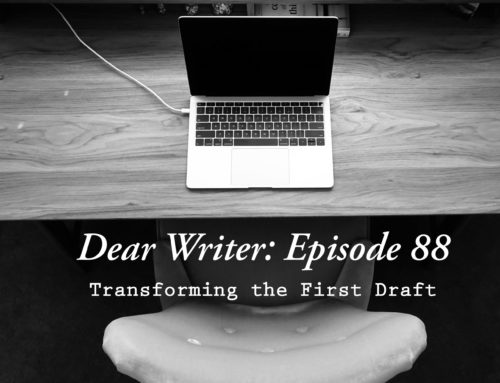
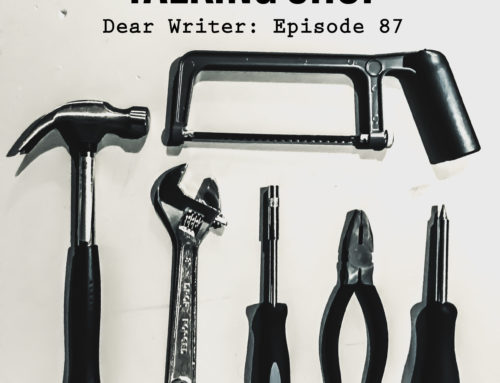

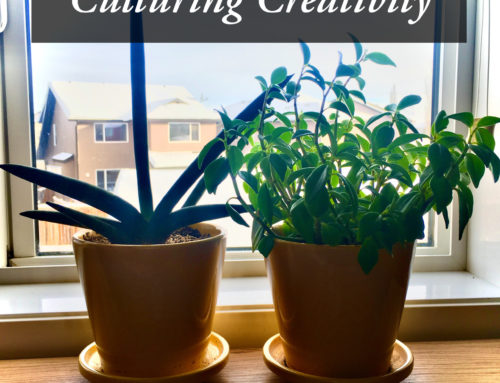

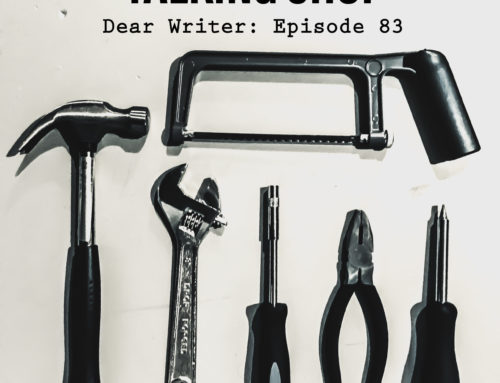


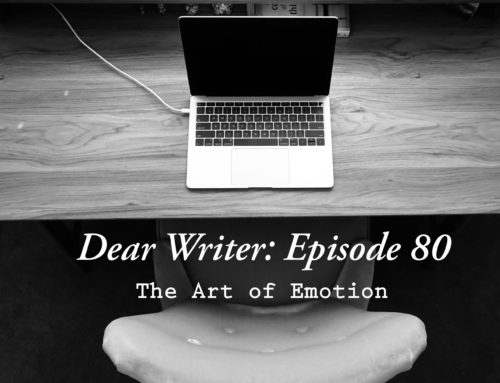
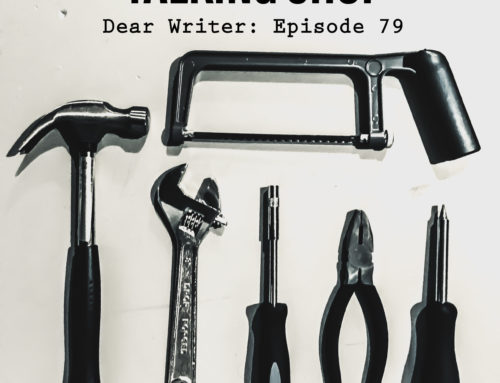
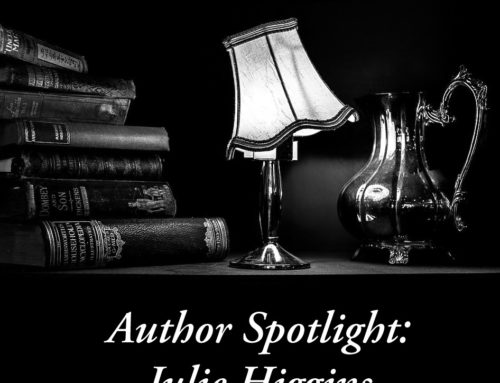
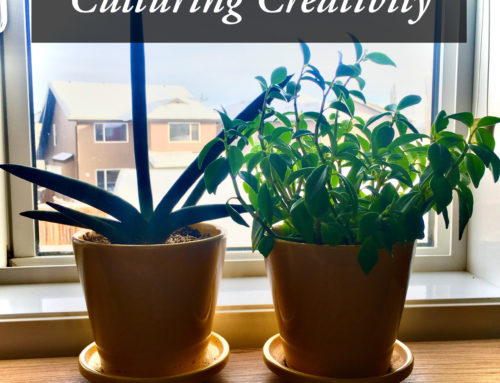
Leave A Comment